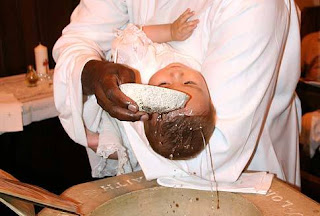Perhaps those involved in the events surrounding February 19, 1974 should have read more Löhe and less Elert.
The following is from the blog "Wilhelm's space" http://kwaweber.org/2014/01/10/lohe-on-2-timothy-316/
All Scripture is inspired by God and profitable for teaching, for reproof, for correction, for training in righteousness. (2Ti 3:16 NAS)
The Holy Scriptures of the Old and New Testament are like the starry skies at night. Whoever lifts up his eyes from the dark earth up to the bright stars above sees the shiniest first – the big ones and those in the milky way. Yet as the eye is accustomed to the sight, it begins to see more and more. Finally even the dark blue of the night seems to be interwoven with light and shining brightness. So it also for the reader of the holy Bible. At first you perceive the strong and catchy verses, which are obviously clear and impressive at first sight. Yet as you continue reading more and more verses light up until you don’t just get the flow of the story, but rather comprehend the perfect harmony, which makes up the whole entirety.
So it’s not just a wise crack to get over the difficulties of some parts, if it is suggested to let the light and insight of the clear and main parts, which make up the rule of faith and guide all exegesis, light up the obscure and darker passages.
Holy Scripture has always proven itself as comprehensible and clear. All supposed obscurity and darkness is not so much its own drawback, but rather rests in the eyes and heart of the reader. All misconceptions, contradictions and heresies projected into God’s Word – and even the most drastic lie, that God’s Holy Spirit did not reveal his truth aptly and comprehensibly in the holy Bible – are not to be blamed against God and his Holy Spirit, but rather fair and square at the doorstep of our human blindness and sinful rebellion, which impede our insight into God’s will and prompt us to disobey his clear commandments and doubt his gracious promises. The holy Word of God suffers the same predicament as the Son of God himself: For the faithful it is faithful and true, for the holy it is holy and sanctified, with the pure it is pure and salvific; yet with the wrongful it is wrong and for the children of darkness it is utter darkness and obscurity. Praise be to God, the Lord, who is the living source of goodness and in whose light we see the light + Amen.
Lord, our God! We thank you for your most holy Word, which shows us the way to you and can save us eternally. Grant that we respect, honour and love your holy Word in such a way, that we trust and believe it, gladly hear, read and learn it and thus be guided from one truth to the other until we see you from face to face, hear you yourself and thus come to the blessed peace you have promised us. Amen.
God’s Word is our great heritage And shall be ours forever; To spread its light from age to age Shall be our chief endeavor. Through life it guides our way, In death it is our stay. Lord, grant, while worlds endure, We keep its teachings pure. Throughout all generations. (Nikolai F. S. Grundtvig, 1783-1872 tr Ole G. Belsheim, 1861-1925)
This is a rather free translation of Wilhelm Löhe’s devotion for the 10th January during the high holiday of Epiphany. It is found on Pg. 51 in Lob sei Dir ewig, o Jesu! (Eternal Praise to you o Jesus!) edited by A. Schuster and published in the Freimund Verlag, Neuendettelsau 1949.




